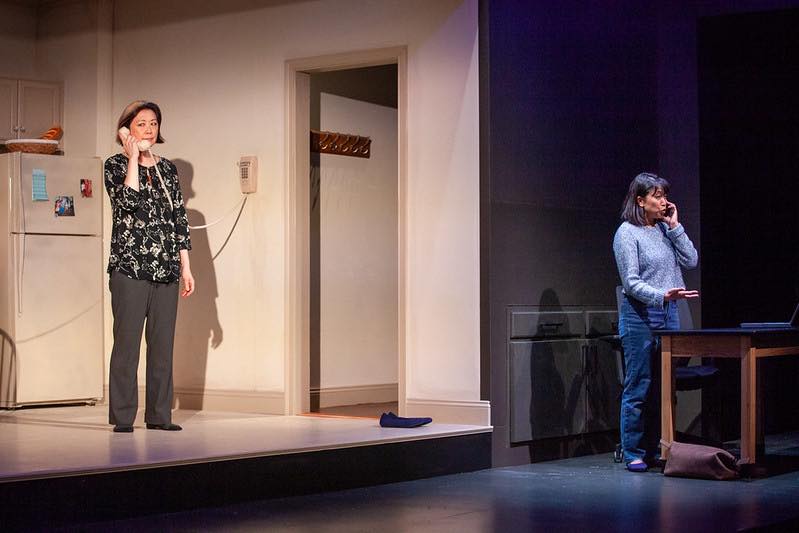
‘What You Are Now’ by Sam Chanse. Directed by Steve Cosson. Scenic Design by Neil Patel. Costume Design by Yao Chen. Lighting Design by Brian J. Lilienthal. Sound Design by David Remedios. Presented by Merrimack Repertory Theatre, 50 E. Merrimack St., Lowell, MA, through May 11, 2025.
By Linda Chin
With a stirring production of What You Are Now closing a stellar seven-show season, Merrimack Repertory Theatre demonstrates its commitment to cultivating new works and community. Sam Chanse’s powerful play had its world premiere in NYC three years ago, but its current run (and New England premiere) at MRT carries special significance: this story about a young neuroscientist whose interest in traumatic memories stemming from her family’s history is actually set in Lowell, Massachusetts, and is bound to resonate deeply with diverse audiences.
Although the location of the family’s home in Lowell is unclear, they presumably settled downtown in what is now known as Cambodia Town. Chantrea (an elegantly poised and eloquently precise Sonnie Brown, reprising her role in the original production) raised her two now-adult children here on her own. Her daughter Pia (a consistently solid and steady Pisay Pao, also reprising her role in the original production) was born and grew up here. A notably hardworking first-generation graduate, Pia is now a postdoctoral researcher in neuroscience, working at a research lab in Boston.
Based on Chantrea’s (and many other Asian parents’) standards, Pia’s older brother, Darany (a hyperenergetic and emotionally endearing character played by Joe Ngo), hasn’t fared as well. Academically disinclined and directionless, he never finished high school, joined a gang, served time in prison, and held a string of minimum-wage jobs.
In addition to their own struggles to balance their work and personal lives, as well as their Cambodian-American identities, Pia and Darany share a warm (though typically complex) sibling relationship and express concerns about their mother’s well-being. A survivor of the Khmer Rouge regime, Chantrea fled Cambodia while pregnant with Pia and with toddler Darany in tow. Chantrea’s recurring nightmares, traumatic memories, and haunted expressions pervade the household and shape her children’s present reality. Although Pia and Darany make repeated attempts to connect, Chantrea adamantly refuses to talk about her life there, including sharing any stories about their father.

Despite their differences, including cultural and generational ones, and their typically complicated parent-child relationships, patience, piety, resilience, and love abound. Pia and Darany try their best to understand and help. After his Thursday shift at a local donut shop, Darany reliably (for the most part) buys a week’s worth of groceries and stocks the family fridge. He takes the initiative to apply for a new salaried position – with benefits! – that’s been recommended by a friend, providing a beacon of hope for his, and the family’s future (but which – spoiler alert – results in an unexpected and unfortunate outcome). Pia has taken a bigger step. Her hopes to heal traumatic memories with scientific treatments is now the focus of her future life’s work.
What You Are Now includes a fair bit of expository language about scientific research studies, Cambodian history, and dance, which weighed it down. I also found parts of the play confusing. The story takes place in 1970s Cambodia, but the action spans a decade that I couldn’t readily identify from the costumes, set, or dialogue (after the fact, I believe it’s set in 2002-2012). The family kitchen, designed by Neil Patel, was a huge space with lined, modern, bright-white wall-to-ceiling cabinets and fancy appliances spanning the width of the stage. It was more elaborate, suburban, and devoid of any cultural elements than I expected.
Sam Chanse has filled her work with questions and ideasthat force you to think. Regarding memory – is it scientifically possible to override, neutralize, or modify painful memories? Would humans be better off as a result? Is it ethical? Regarding identity – Pia’s retort to Darany’s ex-girlfriend Siobhan, who is only half Cambodian (her dad is white), grew up in Connecticut and went to Yale – can you really get what it’s like [to be] or call yourself a real Cambodian? Pia also challenges her lab colleague and boyfriend Evan (Greg Maraio), who seems more socially awkward and accepting, about being white and privileged.
What You Are Now is filled with characters and moments that evoke pleasant memories of my childhood and recent past. Children of immigrants, like my plus-one and I, likely understand Chantrea’s displays of love and affection – by patting Pia on the shoulder and by preparing her favorite dishes. (We did feel bad that her mother thinks she prefers spaghetti with red sauce instead of Nom Banh Chok or other Khmer comfort foods. We also loved seeing Darany dance around the house to Cambodian pop music and get his tightly wrapped sister to dance as well, a memory they will forever cherish. (Having seen Cambodian Rock Band at MRT in 2019, I also understood how music triggers memories that are pleasant and painful).
This powerful and poignant American family story runs through May 11, 2025. Whether a celebration of AAPI Heritage Month or Mother’s Day, it’s worth seeing. For tickets and information, go to: https://mrt.org/

